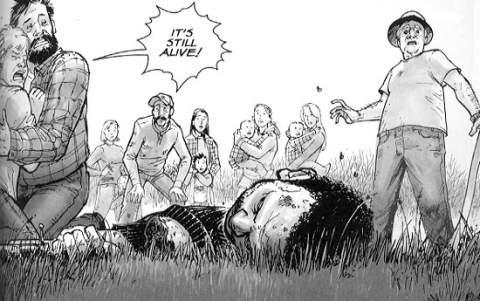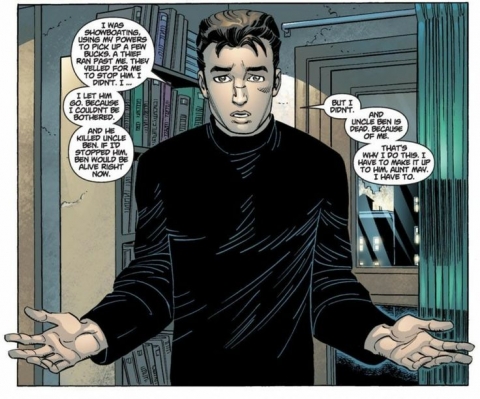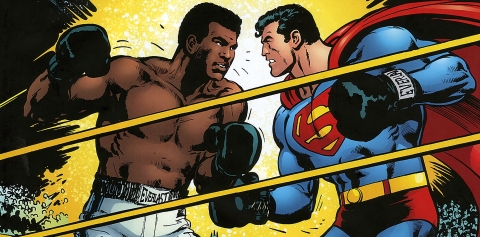52 weeks. 52 different writers. 2 trade paperbacks or hardcovers a week. Each week I’ll take a look at a different writer and read two different collected editions from within that person’s repertoire to help in the examination of their work.
Robert Kirkman is perhaps most well-known for creating the epic zombie horror series, The Walking Dead…but we’ll talk about that one later. Kirkman started his career in comics penning superhero parodies before signing on with Image to help with their new Superhero line. In 2003, Kirkman would launch Invincible before going on to be a mainstay at Marvel Comics, crafting series like the Irredeemable Ant-Man and a two-year run on Ultimate X-Men. In 2008, Kirkman became a partner at Image Comics and then went on to form his own imprint Skybound.
Outcast Vol 1: A Darkness Surrounds Him
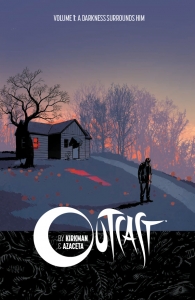 Kyle Barnes is an odd young man who has been through a tumultuous life, constantly plagued by demonic possessions affecting those closest to him. As a young boy he was often beaten by his possessed mother, haunting his life in ways he could never escape. Just when he thought he’d escaped the dark cloud that loomed over him, he was hit with more personal trauma that wreaked havoc on his life in unimaginable ways. Now, years removed from these incidences, it seems like demons are back to plague Kyle’s life in strange ways, drawing him back into the fold against these creatures. Recruited by Reverend Anderson to help a young boy who appears to be possessed, Kyle discovers that he may be the key to defeating these demons. Desperate for answers, Kyle embarks down a dark path in hopes of finding some form of explanation as to why he is an “Outcast”.
Kyle Barnes is an odd young man who has been through a tumultuous life, constantly plagued by demonic possessions affecting those closest to him. As a young boy he was often beaten by his possessed mother, haunting his life in ways he could never escape. Just when he thought he’d escaped the dark cloud that loomed over him, he was hit with more personal trauma that wreaked havoc on his life in unimaginable ways. Now, years removed from these incidences, it seems like demons are back to plague Kyle’s life in strange ways, drawing him back into the fold against these creatures. Recruited by Reverend Anderson to help a young boy who appears to be possessed, Kyle discovers that he may be the key to defeating these demons. Desperate for answers, Kyle embarks down a dark path in hopes of finding some form of explanation as to why he is an “Outcast”.
Robert Kirkman presents the world with a whole new horror series in Outcast. To me, Outcast came off as a rather mixed bag of tricks, with some highly enjoyable aspects as well as some downright treasonous acts against the art form of writing. Perhaps one of the more interesting aspects of this comic, that does greatly affect one’s reading pleasure, is that it has already been optioned for a television show and had been before the first issue was even released. Now one might wonder how that can affect your reading experience, having that knowledge before reading the series, and it does so in a simple way: it reads like it’s written for television. Immediately, you are taken out of any sort of enjoyment you can have for this story because all you can think about is how clearly every aspect of this book feels like it’s just going to, beat for beat, be translated into a television show. Your cliffhangers feel less like the end of a chapter and more like they’re leading you into a commercial break, using these dramatic moments to lead you into the scenes that immediately follow it.
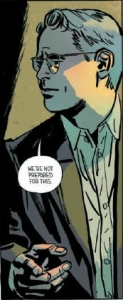 Let’s attack all the bad aspects of this story before we get to the good ones. As I stated, this comic reads like it’s a television show which results in an almost unconventional style to it. No matter what way you try to slice it, in terms of storytelling, it doesn’t follow the proper structure of a story. There’s a clear beginning, a middle by extension, but no real conclusion or end. If you go based off of your three act structure, you have a first act, maybe a bit of a second act, but you’re hard pressed to really define what denotes the start and end of your third act. One could argue that the story itself is all a part of a larger first act (which would be an entirely fair assessment because that’s how it feels) but it’s incredibly disingenuous to give a reader a collected edition of a storyline with next to no resolution for the first arc/chapter. Yet again, one could argue that the final few pages is a form of resolution or provides some development for the lead character of Kyle Barnes but you would be wrong as it doesn’t give even an ounce of resolution towards the central conflict or theme of this book. Instead, the “conclusion” to this volume is a cheap, shoehorned bit of a writing that is force-fed to the reader, establishing this particular “conflict” in the fleeting pages of the third issue. It’s outrageous to try to comprehend any sort of resolution from this first volume of the series as all it really reconciles is that the story is actually ready to begin. Kirkman uses this entire first volume to put pieces in place, which is fine, only to then on the final page finally say “Okay, now we can actually MAYBE start to play with them.
Let’s attack all the bad aspects of this story before we get to the good ones. As I stated, this comic reads like it’s a television show which results in an almost unconventional style to it. No matter what way you try to slice it, in terms of storytelling, it doesn’t follow the proper structure of a story. There’s a clear beginning, a middle by extension, but no real conclusion or end. If you go based off of your three act structure, you have a first act, maybe a bit of a second act, but you’re hard pressed to really define what denotes the start and end of your third act. One could argue that the story itself is all a part of a larger first act (which would be an entirely fair assessment because that’s how it feels) but it’s incredibly disingenuous to give a reader a collected edition of a storyline with next to no resolution for the first arc/chapter. Yet again, one could argue that the final few pages is a form of resolution or provides some development for the lead character of Kyle Barnes but you would be wrong as it doesn’t give even an ounce of resolution towards the central conflict or theme of this book. Instead, the “conclusion” to this volume is a cheap, shoehorned bit of a writing that is force-fed to the reader, establishing this particular “conflict” in the fleeting pages of the third issue. It’s outrageous to try to comprehend any sort of resolution from this first volume of the series as all it really reconciles is that the story is actually ready to begin. Kirkman uses this entire first volume to put pieces in place, which is fine, only to then on the final page finally say “Okay, now we can actually MAYBE start to play with them.
Now, first two paragraphs aside, Outcast is most certainly not a terrible book. It’s a little hokey at times, but still has this oddly addictive quality to it where you want to keep reading. I believe the addictive nature comes from the mysterious nature of the entire story, with Kirkman choosing to slowly tease out the past surrounding the lead character in Kyle Barnes. To an even further point, it’s the multi-layered past of Barnes that keeps things interesting, as you learn about not only the possession of his mother and how it effected him, but the possession of other key characters in his life as well. Seeing how this affects him from childhood and even into adulthood is a gripping facet of the story you can’t look away from. Then the curious nature of what the “outcast” actually means only adds tension into the plot as you never truly know what type of unnatural force could threaten Kyle. Kirkman seeds so many effective elements within the plot that you can look at any minor narrative he establishes and still find something that will make you want to come back for more. The more the story progresses, the more you realize that this is so much more than just a supernatural horror comic. Outcast encompasses themes from the genres of mystery, thriller, crime, and horror to make a surprisingly complete blend of literary enjoyment. That is perhaps where Outcast’s greatest success lies, in the fact that it can be whatever type of comic it wants to be instead of just pigeonhole itself from page one. Make no mistake that it is definitely supernatural horror overall, but don’t think that it won’t surprise you with its use of different genres along the way.
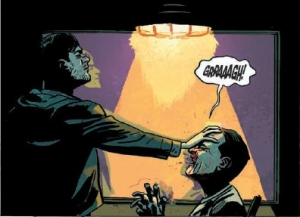 Kyle Barnes and Reverend Anderson are your primary duo of the story, with Kyle being a miserable jerk while Reverend Anderson is the holy warrior of God, setting out to rid the world of the demons that possess innocent souls. The relationship between these two characters is rather interesting and another strong aspect of the story. It’s a classic non-believer vs. man of faith relationship but it’s how their interactions evolve that makes it all come together. You watch Kyle transition from a miserable grump into a man who needs answers, his drive to find resolve far outweighing his initial sense of apprehension. Reverend Anderson is a key element in the push to have Kyle open up more, taking a vested interest in the young man as he begins using him to help a possessed young boy. Following the duo after dealing with that possession, both characters start to turn a bit of a corner, not only in regards to their relationship with each other but in their overall demeanour as well. The cost of being a man of faith begins to take its toll on the Reverend as you move past this first possession he faces with Kyle, appearing to become more worn down with every scene he appears in, while Kyle only becomes stronger, opening up to neighbours, “family”, and even strangers in ways that seemed unlikely at the start of the story. It’s not a stretch to say that Kyle evolves for the better while the Reverend seems to take steps backwards, strengthen one of the central themes of the story wherein everyone close to Kyle becomes hurt or damaged.
Kyle Barnes and Reverend Anderson are your primary duo of the story, with Kyle being a miserable jerk while Reverend Anderson is the holy warrior of God, setting out to rid the world of the demons that possess innocent souls. The relationship between these two characters is rather interesting and another strong aspect of the story. It’s a classic non-believer vs. man of faith relationship but it’s how their interactions evolve that makes it all come together. You watch Kyle transition from a miserable grump into a man who needs answers, his drive to find resolve far outweighing his initial sense of apprehension. Reverend Anderson is a key element in the push to have Kyle open up more, taking a vested interest in the young man as he begins using him to help a possessed young boy. Following the duo after dealing with that possession, both characters start to turn a bit of a corner, not only in regards to their relationship with each other but in their overall demeanour as well. The cost of being a man of faith begins to take its toll on the Reverend as you move past this first possession he faces with Kyle, appearing to become more worn down with every scene he appears in, while Kyle only becomes stronger, opening up to neighbours, “family”, and even strangers in ways that seemed unlikely at the start of the story. It’s not a stretch to say that Kyle evolves for the better while the Reverend seems to take steps backwards, strengthen one of the central themes of the story wherein everyone close to Kyle becomes hurt or damaged.
Collects: Outcast #1-5.
Best Character: Kyle Barnes.
Best Line Of Dialogue/Caption: “Seems like they’ve been trying to hurt me my whole life…I need to find out why.” – Kyle Barnes.
Best Scene/Moment: Kyle and the Reverend interrogate a bad man – Issue 5.
Best Issue: Issue 5. Issue 5 stands out due to a tense scene set in a prison featuring Kyle, the Reverend, and a man in desperate need of some holy intervention. It’s a scene that devours the bulk of the issue but it shows you, that when he’s at his best, Kirkman can write incredibly emotive and immersive scenes that suck you in for their duration and leave you begging for more when they conclude. This interrogation like scene hits a lot of high notes in terms of the dialogue as well as the mood, has a clear climax and will show you why Outcast is a comic you can’t help but continue to read. The only disadvantage to this issue is that you feel like you’re completely robbed of any form of resolution as the conclusion you get isn’t much of a conclusion to the story Kirkman begins telling in issues prior to it at all. Read the issue and you’ll get what I mean with that one.
Why You Should Read It: Outcast is a comic that I’d compare to a cigarette. It’s addictive. It’s a story where, whether you love it or hate it, you’re going to keep reading it if you give it a shot. If I’m being honest, the comic wasn’t necessarily my cup of tea at first but now that I’m removed from reading it and actually writing about it, I want to go back to read the next volume to find out what happens next. It hooks you in a weird way that makes you feel dirty if you try to wash your hands of it and walk away. I’m not really sure if that’s the defining sign of a great or irritating comic but it clearly does something right if it interests you enough to want more even if you didn’t love the first helping. If you like creepy, peculiar supernatural horror then you’ll adore this book for all it’s worth. The mood and tones Kirkman and company set throughout the entire story are genuinely chilling at times and sure to excite you if you enjoy films like “The Exorcist”.
The Walking Dead Book One
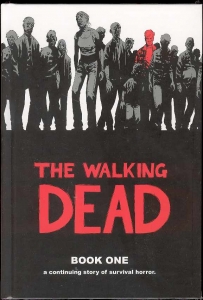 In 2003, shortly after launching the superhero title Invincible for Image Comics, Robert Kirkman launched the zombie horror series, The Walking Dead. Image Comics was dismissive of publishing what they felt would be “just another zombie series” so Kirkman lied claiming that the zombies were actually all part of a plot that featured aliens invading Earth. This premise was somehow more appealing to Image Comics so they pushed the project forward and as of this writing (thankfully) no zombies have appeared in the series. In 2010, Kirkman began producing a television adaptation of the comic, that has since gone on to be one of the most successful shows in cable television history.
In 2003, shortly after launching the superhero title Invincible for Image Comics, Robert Kirkman launched the zombie horror series, The Walking Dead. Image Comics was dismissive of publishing what they felt would be “just another zombie series” so Kirkman lied claiming that the zombies were actually all part of a plot that featured aliens invading Earth. This premise was somehow more appealing to Image Comics so they pushed the project forward and as of this writing (thankfully) no zombies have appeared in the series. In 2010, Kirkman began producing a television adaptation of the comic, that has since gone on to be one of the most successful shows in cable television history.
Rick Grimes awakes in an empty hospital weeks after getting gunned down in the line of duty but a lunatic with a shotgun. Struggling to his feet and calling for any form of assistance, Rick rapidly comes to the conclusion that he is alone. Gathering his clothes and some courage, Rick begins to search the hospital for any sign of what may have transpired during his comatose state. To Rick’s horror the entire hospital has been overrun by the undead who hunger for living flesh. Narrowly escaping with his life, Rick sets out to his home to discover that his wife and son are not there and much of the town has been deserted. He discovers Morgan and Duane in his neighbours home, seeking refuge from the zombies that walk the street. Rick lends the father and his son a hand by providing them with weapons and a vehicle from the police compound lock up before heading out towards Atlanta in hopes of finding his own family. With nothing more than a horse and a bag of guns, Rick bravely charges into Atlanta only to discover that the major city has also been overrun by zombies. Now with little hope of finding his family, Rick must fight for survival every day for the rest of his life as the world he knew is all but lost.
Robert Kirkman begins his epic zombie survival story here with the first hardcover volume of The Walking Dead. A thrilling breath of fresh air to the zombie/horror genre, Kirkman’s The Walking Dead paves the way for the future, redefining the way readers will come to view both genres for years to come. Simply put, Kirkman crafts a survival horror story the stuns the reader into silence as they turn page after page, anticipating what comes next. Kirkman throws world building largely aside in favour of telling character driven stories with The Walking Dead, focusing on the life and times of former Sheriff Rick Grimes as well as his family, allies, and enemies that he develops on the slippery slop to surviving one day at a time.
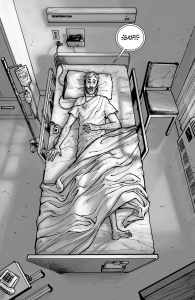 It’s a little odd to go back and read The Walking Dead now versus when it was at the high of its popularity. It’s a series that reads at its best in large doses, hence why the collected formats of the trade paperbacks, hardcovers, and the colossal sized compendiums are so popular amongst readers. I vividly recall reading the first compendium at around the time the second season of the television adaptation for the comic had come out and then read the second compendium shortly there after. In being able to consume the comic is such large dose, and not taking a critical stance on the series, I found myself adoring what I was reading. Now, reading the first twelve issues in the hardcover format, I realize that there’s a lot of great and awful things about the series. One of the largest weaknesses of the early stages of this story is the dialogue. It’s an instance where you can see the inexperience Kirkman had as a writer when the story came out over a decade ago as much of the dialogue is (and this is putting it kindly) atrocious. Time after time you’re pelted with dialogue that does nothing for the story or doesn’t tell you anything about the character, making the characters feel like cardboard placeholders until the next major story beat comes along and wreaks havoc upon the unfortunate existence of Rick Grimes. The character interactions aren’t rich or enlightening, they’re mind numbing and hurt to read. It’s not a stretch to sit here and say that the dialogue through the first twelve issues of The Walking Dead is genuinely cringe worthy, basically leaving you begging for a zombie to come up and bite someone so the characters stop talking with haste.
It’s a little odd to go back and read The Walking Dead now versus when it was at the high of its popularity. It’s a series that reads at its best in large doses, hence why the collected formats of the trade paperbacks, hardcovers, and the colossal sized compendiums are so popular amongst readers. I vividly recall reading the first compendium at around the time the second season of the television adaptation for the comic had come out and then read the second compendium shortly there after. In being able to consume the comic is such large dose, and not taking a critical stance on the series, I found myself adoring what I was reading. Now, reading the first twelve issues in the hardcover format, I realize that there’s a lot of great and awful things about the series. One of the largest weaknesses of the early stages of this story is the dialogue. It’s an instance where you can see the inexperience Kirkman had as a writer when the story came out over a decade ago as much of the dialogue is (and this is putting it kindly) atrocious. Time after time you’re pelted with dialogue that does nothing for the story or doesn’t tell you anything about the character, making the characters feel like cardboard placeholders until the next major story beat comes along and wreaks havoc upon the unfortunate existence of Rick Grimes. The character interactions aren’t rich or enlightening, they’re mind numbing and hurt to read. It’s not a stretch to sit here and say that the dialogue through the first twelve issues of The Walking Dead is genuinely cringe worthy, basically leaving you begging for a zombie to come up and bite someone so the characters stop talking with haste.
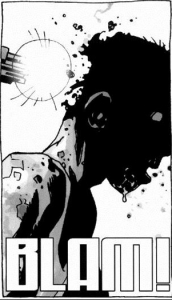 As much as the dialogue is god awful (along with the pace of the plot being shaky and questionable at times) there are still plenty of redeeming factors to the zombie epic that Kirkman has created. One of the best parts of this first volume is Kirkman finds ways to keep the wheels spinning in original ways. In a survival horror story the key goal of the characters you follow is to survive, something that Kirkman experiments with time and time again as he gathers a unique cast of characters together. He takes your family man in Rick Grimes, whose sole purpose is to survive to see his family survive, and combines him with characters like Glenn, Andrea, Dale, Herschel, Shane, and so many other characters that it almost becomes difficult to keep track of them all. A young man like Glenn, someone who was a nobody before the zombie apocalypse, naturally fits into the role of a scavenger, searching for food and supplies for the group because he has nothing to lose by going out into the world and exploring, lacking any form of emotional tethers to the group. Characters like Dale or Herschel, on the other hand, are men who have experienced loss at the hands of the zombies already but bring wisdom to the cast as well as a sense of safety, with Dale offering safe transportation for characters while Herschel provides shelter on his farm. The two characters fit into the archetype of being your wise, elderly figure who can and will make important calls but naturally fall behind the limelight of a leader like Rick. These characters form the backbone of your cast with other members like Shane, Andrea, Tyrese, and more, providing different elements that help heighten the drama of the story.
As much as the dialogue is god awful (along with the pace of the plot being shaky and questionable at times) there are still plenty of redeeming factors to the zombie epic that Kirkman has created. One of the best parts of this first volume is Kirkman finds ways to keep the wheels spinning in original ways. In a survival horror story the key goal of the characters you follow is to survive, something that Kirkman experiments with time and time again as he gathers a unique cast of characters together. He takes your family man in Rick Grimes, whose sole purpose is to survive to see his family survive, and combines him with characters like Glenn, Andrea, Dale, Herschel, Shane, and so many other characters that it almost becomes difficult to keep track of them all. A young man like Glenn, someone who was a nobody before the zombie apocalypse, naturally fits into the role of a scavenger, searching for food and supplies for the group because he has nothing to lose by going out into the world and exploring, lacking any form of emotional tethers to the group. Characters like Dale or Herschel, on the other hand, are men who have experienced loss at the hands of the zombies already but bring wisdom to the cast as well as a sense of safety, with Dale offering safe transportation for characters while Herschel provides shelter on his farm. The two characters fit into the archetype of being your wise, elderly figure who can and will make important calls but naturally fall behind the limelight of a leader like Rick. These characters form the backbone of your cast with other members like Shane, Andrea, Tyrese, and more, providing different elements that help heighten the drama of the story.
Even with a wide array of different cast members, Rick Grimes is still the runaway lead of a story that largely ends up being his story of survival. The first chunk of the story deals with his search for his missing wife and son, before transitioning off into his attempts to help a large group of other characters survive. Rick is a natural fit for the leadership role, being a Sheriff before the zombie outbreak occurred, and never seems to shy away from doing what he needs to ensure the survival of “his” group. There’s something about the character that makes him equal parts enigmatic and badass, endearing you as this tragic hero who is in a constant cycle of hope and despair. There is never any true victory attainable for the character as the only way to “beat” the zombie hordes is to survive, seeing as they vastly outnumber the living in this story and even then it’s an inevitability that every character will die at some point. To Rick, there is no clear way to stop the zombies for good so the story becomes about surviving at any cost, with there always being unfortunate casualties of survival. Even in the later stages of this volume, you can see the strain of leading this group of survivors beginning to take its toll on Rick, having to ensure these people end up with warms beds and full bellies everyday of their now difficult lives. It’s part of what makes Rick the perfect lead character though, his desire to forge onwards in the face of adversity, knowing fully well that the only way this all ends is likely with the death of all these people he has grown close to.
It seems important to close out this look at The Walking Dead with how different it is than your average zombie/survival horror story, even if it heavily borrows elements from both genres. Kirkman quickly establishes that the zombies are a threat in this world but is even quicker to start paving the way to what really creates true conflicts for the characters: other humans. It’s an ever-present theme throughout this entire first hardcover collection, with the end of both chapters one and two being punctuated by decisions made by other human characters. It gives this zombie story a unique sense of humanity that can be lost on readers who just want zombie carnage the entire time. It’s largely what makes The Walking Dead shine so brightly, that since the first arc the story has always been about how the humans are the true danger unto themselves, even when the world is falling apart around them.
Collects: The Walking Dead #1-12
Best Character: Rick Grimes
Best Line Of Dialogue/Caption: “My nose itches…” – Glenn
Best Scene/Moment: Showdown in the forest – Issue 6
Best Issue: Issue 5. Issue five is the dramatic climax of the first chapter in this hardcover collection, where you see tensions nearly boil over between members of the group and the catastrophic consequences of what happens when you let your guard down for even a second. It’s sad, fast paced, and sure to catch you off guard if it’s your first time reading this story.
Why You Should Read It: It’s not a hyperbole to say that The Walking Dead is the best zombie comic ever. Kirkman builds characters you fall for and come to care deeply about before brutally killing many of them, starting off that terribly addictive trend with this first hardcover collection. It’s a comic that will make you think you’ve seen it all when it comes to zombie/horror comics but then Kirkman crosses lines you didn’t even know existed. This first hardcover is just a simple open salvo for what’s to come further on down the line in a series that’s like wine, always getting better with time.


